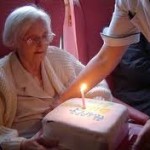Dementia is a known condition that involves the inability to reason, memorize, and think, that affects one’s activities of daily living. It is said that it is not a disease per se but a collection of symptoms brought about by underlying health conditions. Some form of dementia can be cured but others cannot. It is important for your doctor to understand the other diseases that you may have to see if it is treatable. Some causes of dementia are substance abuse, diseases of the blood vessels, diseases of the nerve cells, deficiencies, hydrocephalus, infections of the spinal cord and brain, head injuries, and other illnesses. Today, more and more people above 65 years of age suffer from dementia.
Treatable forms of dementia are those that are caused by deficiencies, hypothyroidism, hypoglycemia, head injuries, tumors, and substance abuse (long-term). Those that are untreatable are caused by CJD (Creutzfeldt-Jakob disease), Parkinson’s disease, AIDS, small strokes, and Alzheimer’s disease. Dementia, like any other progressive diseases, has several stages. The following are the different dementia stages that you may want discuss with your physician:
1. Cognitive impairment  (absent)
 This is the first of the dementia stages wherein the patient does not exhibit any types of problems in memory even upon interview by a healthcare professional.
This is the first of the dementia stages wherein the patient does not exhibit any types of problems in memory even upon interview by a healthcare professional.
2. Cognitive decline (very mild)
 This is number two of the dementia stages wherein the patient already has lapses in memory. An example of this is constantly forgetting where they left their everyday gadgets. Even if the patient experiences this, it is not evident during an actual interview with the healthcare professional. It isn’t even obvious to other people that the patient is always with.
This is number two of the dementia stages wherein the patient already has lapses in memory. An example of this is constantly forgetting where they left their everyday gadgets. Even if the patient experiences this, it is not evident during an actual interview with the healthcare professional. It isn’t even obvious to other people that the patient is always with.
3. Cognitive decline (mild)
 This is the stage where lapses in concentration and memory are already starting to notice the deficiencies. These may already be noticeable during clinical interviews and tests. Some areas of difficulty are finding the right word or name, remembering names, everyday performance, comprehension in reading, maintaining possession of an object, and organization.
This is the stage where lapses in concentration and memory are already starting to notice the deficiencies. These may already be noticeable during clinical interviews and tests. Some areas of difficulty are finding the right word or name, remembering names, everyday performance, comprehension in reading, maintaining possession of an object, and organization.
4. Cognitive decline (moderate)
 This is where the healthcare provider already establishes significant amount of deficiencies in remembering recently concluded events or occasions, performing arithmetic challenges, performing difficult tasks, remembering personal history, and facing challenging situations (mentally, socially), that results to the patient being withdrawn.
This is where the healthcare provider already establishes significant amount of deficiencies in remembering recently concluded events or occasions, performing arithmetic challenges, performing difficult tasks, remembering personal history, and facing challenging situations (mentally, socially), that results to the patient being withdrawn.
5. Cognitive decline (moderate severe)
 This is the fifth of the dementia stages wherein the patient experiences major blanks in memory and cognition. Everyday assistance is already needed by patients that are in this stage of dementia. Some areas where the patient needs help are giving basic information during medical interviews, remembering the present date, time, and location, performing much simpler arithmetic tasks, and selection of clothes. But even if patients already experience these major gaps in information, they need not be assisted in using the toilet or eating. They could also still remember much information about themselves and their family.
This is the fifth of the dementia stages wherein the patient experiences major blanks in memory and cognition. Everyday assistance is already needed by patients that are in this stage of dementia. Some areas where the patient needs help are giving basic information during medical interviews, remembering the present date, time, and location, performing much simpler arithmetic tasks, and selection of clothes. But even if patients already experience these major gaps in information, they need not be assisted in using the toilet or eating. They could also still remember much information about themselves and their family.
6. Cognitive decline (severe)
 Of all the dementia stages, this is the stage wherein the patient’s condition starts to get worse. Personality changes may already emerge and the patient already needs a n extensive amount of aid in activities of daily living. In this stage, the patient already loses much awareness of recently concluded activities or events; the patient is already much unaware of the surroundings; the patient imperfectly recalls personal information and could still remember his or her own name; the patient forgets the names of spouse or caregiver occasionally; the patient could still recognize a familiar face; the patient needs to be helped in getting dressed; the patient has interrupted sleep; the patient needs help in using the toilet; the patient already has episodes of incontinence (fecal and urinal); the patient experiences changes in personality and behavior (delusions, hallucinations, compulsiveness); and the patient tends to become lost.
Of all the dementia stages, this is the stage wherein the patient’s condition starts to get worse. Personality changes may already emerge and the patient already needs a n extensive amount of aid in activities of daily living. In this stage, the patient already loses much awareness of recently concluded activities or events; the patient is already much unaware of the surroundings; the patient imperfectly recalls personal information and could still remember his or her own name; the patient forgets the names of spouse or caregiver occasionally; the patient could still recognize a familiar face; the patient needs to be helped in getting dressed; the patient has interrupted sleep; the patient needs help in using the toilet; the patient already has episodes of incontinence (fecal and urinal); the patient experiences changes in personality and behavior (delusions, hallucinations, compulsiveness); and the patient tends to become lost.
7. Cognitive decline (very severe)
 This is the last of the dementia stages that is the most challenging of all. This is where the patient doesn’t respond to their surroundings anymore. They cannot speak or control their own movements as well. If they could speak, it would only be a few phrases or words. The patient already needs extensive help during toilet trips and eating. Urine incontinence is already apparent. Assistance in walking is already necessary. The patient cannot sit without needed support, cannot maintain their head up, cannot swallow, and cannot smile. They already have abnormal reflexes and rigid muscles.
This is the last of the dementia stages that is the most challenging of all. This is where the patient doesn’t respond to their surroundings anymore. They cannot speak or control their own movements as well. If they could speak, it would only be a few phrases or words. The patient already needs extensive help during toilet trips and eating. Urine incontinence is already apparent. Assistance in walking is already necessary. The patient cannot sit without needed support, cannot maintain their head up, cannot swallow, and cannot smile. They already have abnormal reflexes and rigid muscles.
It is important that your doctor is well informed about the status of your loved one or friend. This way, necessary changes in management of dementia can be made. Heartbreak is common in dealing with this condition as each of the dementia stages worsen. But you have to be strong and help I the fight.
